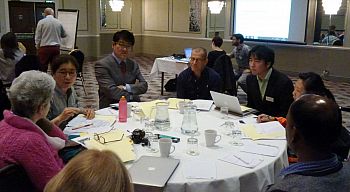Sussex helps foster collaboration on patient activism at global level
An international workshop this week on Patient Organisation Activism around the World provided a rare opportunity to explore activities and facilitate exchanges among patient organisations from Asia, the USA and the Europe.
The two-day event in Brighton, organised by the University’s Centre for Bionetworking, aimed to exchange ideas about the work accomplished by patient organisations active in various countries with regards to Muscular Dystrophy and Spinal Cord Injury.
 The workshop, organised by Sussex's Centre for Bionetworking, provided an opportunity for patient organisations from around the world to meet and share their experiences
The workshop, organised by Sussex's Centre for Bionetworking, provided an opportunity for patient organisations from around the world to meet and share their experiences
Three lively and innovative panels, involving 12 different patient support groups from Europe, Asia and the USA, included senior staff from:
- United Parent Projects Muscular Dystrophy Italy,
- Action Duchenne and Aspire UK,
- Halfway Home in Beijing,
- Muscular Dystrophy Association China,
- Japan Spinal Cord Foundation,
- Taiwan Muscular Dystrophy Association,
- Korea Spinal Cord Injury Association,
- Muscular Dystrophy Foundation India,
- The Spinal Foundation India,
- and Unite to Fight Paralysis (USA).
The workshop was designed to bring a series of well-established organisations together with more recently founded ones for the purpose of exchanging experiences, ideas and perspectives, with an eye on enhancing the impact of their activities in the area of patient welfare.
Delegates had the opportunity to explore in some detail the similarities as well as differences in distinct welfare regimes and patient-care systems across a wide range of contexts spanning the globe.
An array of patients’ needs were identified, ranging from health care to appropriate housing, day-to-day care, social isolation and other psychological effects, dealing with financial issues and family impact.
One of the main issues to arise was that, despite overall agreement as to the ultimate goal of patient organisations, i.e. working towards finding a cure and improving patients’ overall quality of life, delegates became acutely aware of the effects that differences in national and local welfare systems have on the conduct of their activities.
Louis Stanislas, for example, from the Muscular Dystrophy Foundation India, pointed out that in India patient organisations have to deal with inadequate diagnostic systems as well as patients’ basic needs and day-to-day care due to insufficient state provision for health care.
Similar concerns were echoed by delegates from China, who stressed that due to facing such constraints, patient organisations’ funding for further research into potential cures was low in their list of priorities.
However, it was noted that much important and innovative research, especially in stem cells, is currently being undertaken in India and China and other emerging economies, generating hope - and possibly disappointment - for the future of patients and their organisations alike.
In her contribution, Professor Margaret Sleeboom-Faulkner, Director of the Centre for Bionetworking, stressed that the purpose of the workshop was not only to provide a discussion forum, but also to facilitate mutual learning and closer collaborations among patient organisations.
To this end, workshop organisers will produce and circulate an email list among delegates. In partnership with the participating organisations, workshop organisers will also compile a report on the present and future global agenda for patient needs and activism that will be circulated more widely.
Such plans resonate closely with participants’ perspectives. Komal Kamra, from The Spinal Foundation India, enthused that this was the first time that she had the opportunity to sit around the table with patient groups from around the world and declared her intention to replicate such an event in India in the near future.
In her blog about the workshop, Nicoletta Madia, of United Parent Projects Muscular Dystrophy Italy, wrote: “One global voice can make the difference. If patient organizations are able to build a community, put together different voices that, at the end, become a common voice, if they … cooperate with all experts involved in the disease, they will build a more inclusive world where difference is celebrated and common rights are shared.”
